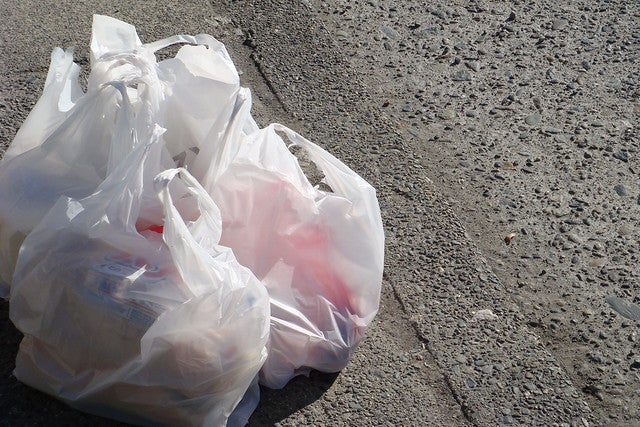
UK supermarkets are taking steps towards going plastic-free. With growing awareness of the effects of single-use plastic on the environment, retailers are making pledges to cut out the use of plastic in their stores.
Retail Insight Network looks at how some of the biggest UK supermarket chains are making changes in their stores to become plastic-free and tackle the plastic waste problem.
Iceland
In July this year, Iceland launched the UK’s first plastic-free bag store in Hackney, offering customers paper, jute and cotton bags as an alternative.
The six-month coincides with a trial in stores in North Wales, Wirral and Cheshire to offer paper bags alongside the regular plastic bags for life.
It is estimated the trial will save over 210,000 plastic carrier bags from being purchased from new. Last year the retailer became the first in the world to commit to removing all plastic from its own-label packaging by the end of 2023.
Iceland managing director Richard Walker said: “We know that many customers are using ‘bags for life’ only once and the retail industry needs to work together to challenge this behaviour and find alternative solutions. Over 1.2 billion plastic bags for life were sold last year in the UK and this needs to change drastically.

US Tariffs are shifting - will you react or anticipate?
Don’t let policy changes catch you off guard. Stay proactive with real-time data and expert analysis.
By GlobalData“These trials will help us to understand how our customers feel about removing one of the most common objects associated with plastic, the supermarket carrier bag, and how they respond to various alternatives. We’re looking forward to seeing how customers respond and using the results of the trial in our wider plans to reduce our plastic footprint.”
Sainsbury’s
The UK’s second-largest supermarket chain Sainsbury’s launched a trial in July this year to remove plastic bags from its fruit and vegetable aisles in a bid to reduce waste.
The trial took place in its Lincoln and Kidlington stores, where customers were encouraged to bring their own containers for loose fruit and vegetables, or buy a reusable bag made from 100% recyclable materials.
The company said the trial was a step towards its commitment to remove 10,000t of single-use plastic this year, alongside introducing water refill stands in stores.
Sainsbury’s Brand director Judith Batchelar said: “We’re pleased to be making a further commitment to our customers as we work with them to offer new ways to reduce unnecessary plastic. This is just one of the efforts we are making as a business and we look forward to hearing how our customers respond and adapt throughout the trial.”
Asda
Supermarket giant Asda will stop providing single-use plastic carrier bags with its online grocery orders removing around 85 million plastic bags from being produced each year.
After a successful trial in South-West England and it Dartford Home Shopping Centre, the retailer removed the option to have ‘bagged’ delivery on grocery home shopping and click & collect orders nationwide from 31 July this year, saving over 500 tonnes of plastic.
Asda was the first supermarket to eliminate single-use carrier bags from its stores in 2018; it now produces 375 million fewer plastic bags each year.
Asda’s online grocery vice-president Simon Gregg said: “We’re working hard to reduce avoidable plastic wherever we can – because helping to reduce its impact on the environment matters to us, and we know it matters to our customers too. This is a simple change, but will have a significant impact on the amount of plastic we use as a business.”
Lidl
In 2018 Lidl was the first British supermarket to remove black plastic from its fruit and vegetable packaging, saving an estimated 50 tonnes of plastic from going to landfill each year.
It was removed from products including mushrooms, baby sweetcorn, asparagus, broccoli and cauliflower. The supermarket also committed to removing black plastic from its fresh meat, fish and poultry products by August this year.
Lidl has reduced plastic packaging by 20% on its own-label products and has committed to ensuring that 100% of its own-label packaging will be widely recyclable, reusable or refillable.
Lidl commercial board director Ryan McDonnell said: “This significant move away from black plastic demonstrates our dedication to tackling this important topic. We recognise the current challenge that black plastic presents to the recycling industry, which is why we have made it our priority to remove it from our fresh ranges.
“As part of our commitment to achieving our ambitious targets, we are continually exploring opportunities to cut our packaging, and where packaging is necessary to protect food and minimise food waste, we will ensure that it is reusable, refillable or recyclable.”
Waitrose
In January this year, Waitrose & Partners hit its target of removing black plastic from hundreds of products as a step towards its goal of removing black plastic on all its own-brand products by the end of 2019.
It has also removed hard-to-recycle black plastic on produce including fresh meat, fish, poultry, fruit and vegetables reducing over 1,300 tonnes of black plastic per annum.
Waitrose & Partners has reduced its packaging by almost 50% since 2009, by removing disposable coffee cups from its shops, eliminating microbeads from products and innovating in alternatives to plastic.
The company aims to have 100% of its own-brand product packaging recyclable by 2023; at the moment 70% of its plastic is widely recyclable.
Waitrose head of CSR, health and agriculture Tor Harris said: “Eliminating black plastic is a priority for us. While removing it we have also taken the opportunity to reduce the amount of plastic of any colour by removing trays from fruit and veg like apples, broccoli and pak choi.
“We are making progress all the time and are determined to maintain our momentum which is why we’re now looking at ready meals and other products so we can achieve our aim of removing all black plastic from our own-label products by the end of 2019.”



